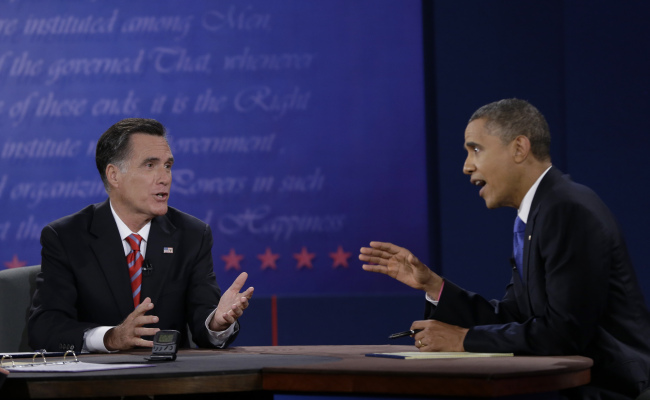All South Korean major presidential candidates appear to be leaning toward more dialogue and engagement as they share the view that President Lee Myung-bak’s strictly reciprocal policy was not effective given soured inter-Korean ties.
But U.S. President Barack Obama and his Republican rival Mitt Romney, who are caught in a tight race ahead of the November election, seem poised to employ a stricter policy.
Smooth policy coordination between Seoul and Washington and the allies’ united stance have been crucial in deterring the North given that differences in their approaches in the past have caused cracks in the alliance and security concerns, experts pointed out.
 |
| U.S. President Barack Obama and Republican presidential nominee Mitt Romney discuss a point during the third presidential debate at Lynn University, in Boca Raton, Florida, Monday. (AP-Yonhap News) |
“Should Romney, a realist candidate, push for his policy, this could clash with a liberal leader in Seoul, such as Moon Jae-in of the Democratic United Party ― should one be elected,” said Huh Moon-young, a senior fellow at the state Korea Institute for National Unification.
“Should Park Geun-hye of the ruling Saenuri Party be elected and adopt a conservative policy, this could cause less friction with the U.S. but might not help defuse tension on the peninsula much. So either way, the situation is quite difficult, and thus leaders’ role is of great importance.”
Obama, has himself, repeatedly said that there would be “no rewards for bad behavior,” and that the U.S. along with South Korea would break the pattern of Pyongyang launching provocations and winning rewards.
In the face of an increasing offensive from his political rival, Obama appears to take a stronger stance on the communist state, observers said.
Romney has been attacking Obama, accusing him of being “soft and weak” on his handling of foreign affairs including North Korea. One of Obama’s policy flip-flops Romney cited was the so-called Leap Day deal which Pyongyang breached in April by launching a long-range rocket.
Under the deal, which was initially seen as a breakthrough in the strained ties between the U.S. and the North, the Obama administration pledged 240,000 tons of “nutritional aid” in return for Pyongyang’s pledge to temporarily suspend nuclear and missile tests.
“A key mistake in President Obama’s policy toward North Korea has been to grant it a series of carrots in return for only illusory cooperation,” Romney’s campaign said in his policy explanation listed on his website.
Regarding the denuclearization issue, Romney appears stricter in his policy.
“Over the years, North Korea has found that its pursuit of a nuclear weapon reaps it material and diplomatic rewards, taking away any incentive for it to end its program,” he said.
“Mitt Romney will reverse that dynamic. The United States will make it unequivocally clear to Pyongyang that continued advancement of its nuclear program and any aggression will be punished instead of rewarded, and any food aid will be de-linked from the nuclear weapons issue.”
Another area Seoul and Washington could differ is the denuclearization process, observers said. Seoul has focused on the North’s denuclearization, but the U.S. has paid more attention to non-proliferation as a way toward the ultimate goal of denuclearization.
Experts say that as denuclearization is a long-term process, Seoul had better employ more policy flexibility to spur policy cooperation with the U.S.
By Song Sang-ho (sshluck@heraldcorp.com)








